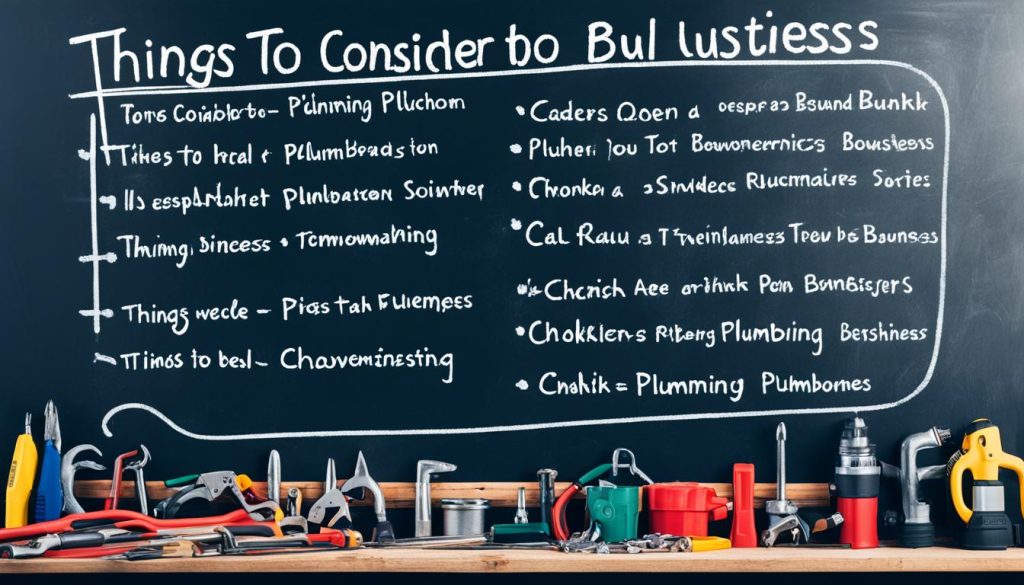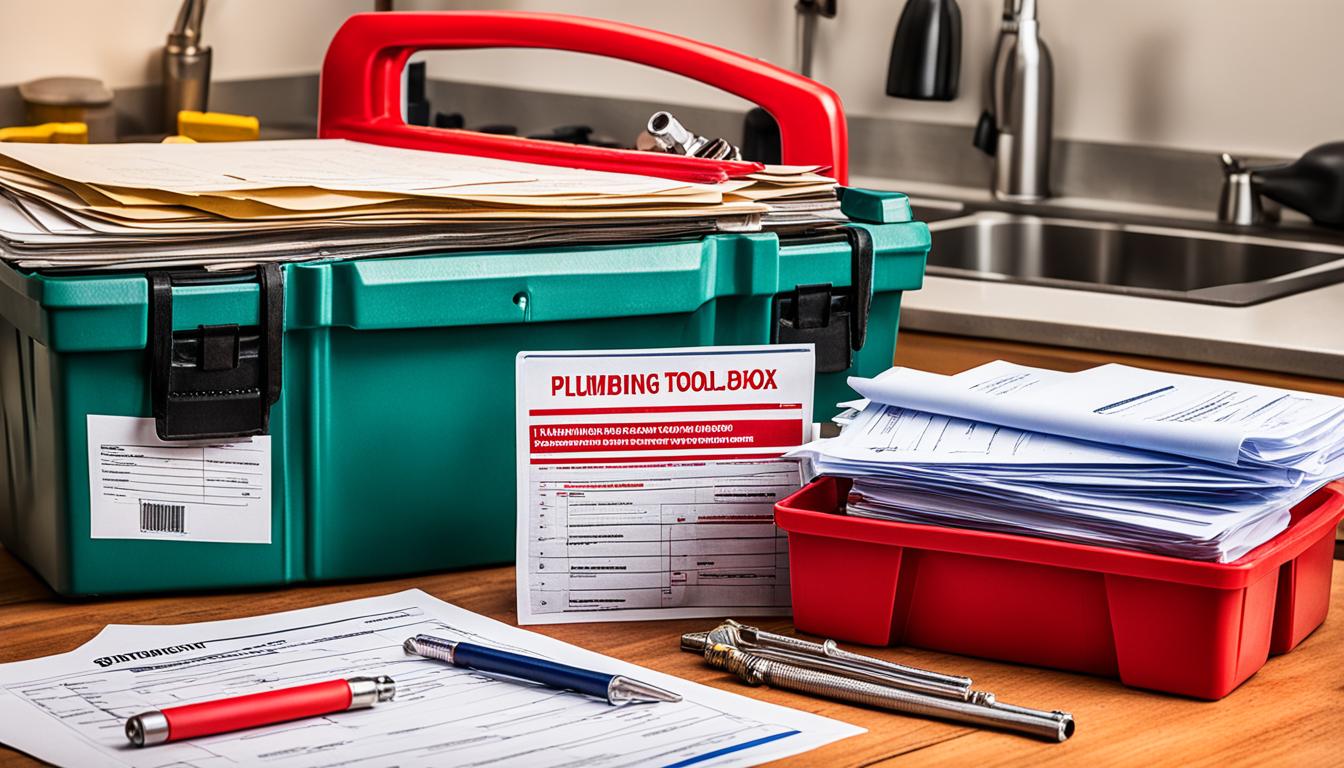Did you know that the plumbing industry in Canada is projected to reach a market size of $12.3 billion by 2026? With the increasing demand for plumbing services, starting a plumbing company can be a lucrative and rewarding entrepreneurial venture. However, the process of setting up a plumbing business requires careful planning, essential considerations, and strategic decision-making.
Whether you have years of experience as a plumber or are new to the industry, this comprehensive guide will walk you through the step-by-step process of launching a successful plumbing business. From obtaining the necessary licenses and permits to developing effective pricing strategies and managing daily operations, you’ll gain valuable insights and tips to navigate the journey of starting your own plumbing company.
Key Takeaways:
- Starting a plumbing business in Canada offers significant growth opportunities due to the increasing demand for plumbing services.
- Launching a plumbing company requires careful planning, obtaining necessary licenses, and developing effective pricing strategies.
- Managing daily operations, such as appointment scheduling, inventory tracking, and customer service, is crucial for the success of your plumbing business.
- Utilizing comprehensive business management software, such as Upper, can streamline operations and contribute to the growth of your plumbing company.
- By following the steps and tips outlined in this guide, you can establish a solid foundation for a successful plumbing business in Canada.
10 Steps to Start Your Plumbing Business
Starting a plumbing business requires careful planning and preparation. By following these 10 steps, you can set yourself up for success in the plumbing industry:
- Create a strong business plan: Develop a comprehensive plan that outlines your services, target market, financial projections, and marketing strategies.
- Ensure the uniqueness of your business name: Conduct a thorough search to ensure that your chosen business name is not already in use.
- Choose the appropriate business structure: Determine whether you want to operate as a sole proprietorship, partnership, limited liability company (LLC), or corporation.
- Register your business: Register your plumbing business with the local government and obtain the necessary licenses and permits required to operate legally.
- Get proper plumbing training: Acquire the necessary plumbing skills and knowledge through apprenticeships, vocational programs, or trade schools.
- Obtain business insurance: Protect your business and customers by investing in the right insurance coverage, including general liability and professional liability insurance.
- Set up a business bank account: Separate your personal and business finances by opening a dedicated business bank account.
- Secure funding for initial capital: Determine how much capital you need to start your plumbing business and explore funding options such as loans or grants.
- Invest in necessary equipment: Purchase high-quality tools, equipment, and vehicles needed to provide plumbing services efficiently.
- Establish proper pricing strategies: Develop a pricing system that considers your overhead costs, material prices, labor expenses, and desired profit margins.
By following these steps, you will be well-prepared to start your own plumbing business and serve customers with professionalism and expertise.
Things to Keep In Mind Before Starting a Plumbing Business
Starting a plumbing business can be an exciting and profitable venture. However, before diving into the world of entrepreneurship, there are several essential considerations to keep in mind. By carefully evaluating these factors, you can set the foundation for a successful plumbing business.
Market Demand and Competition Analysis
One of the first considerations is to assess the market demand for plumbing services in your area. Research the demographics, population growth, and economic trends to determine if there is sufficient demand for your services. Additionally, conduct a thorough analysis of your competition to understand their strengths, weaknesses, and pricing strategies. This information will help you position your business effectively and identify unique opportunities within the market.
Local Regulations and Requirements
Complying with local regulations and requirements is crucial for any plumbing business. Research the licensing and certification requirements specific to your area and ensure that you meet all the necessary criteria. Familiarize yourself with plumbing codes, permits, and inspections to ensure compliance with local laws and regulations. By starting your business on the right foot, you can avoid potential legal issues and establish credibility with your clients.
Financial Readiness
Starting a plumbing business requires careful financial planning and preparation. Consider the initial costs involved in setting up your business, including licensing fees, insurance premiums, equipment purchases, and marketing expenses. Determine how much working capital you will need to cover your operating costs and sustain your business during the initial phase. It may also be beneficial to secure funding through business loans or grants to ensure you have the necessary resources to get started.
Personal Skills and Experience
Assessing your personal skills and experience is vital when starting a plumbing business. Evaluate your technical expertise in plumbing and identify any areas where further training or certifications may be necessary. Consider your business management skills, customer service abilities, and problem-solving capabilities to ensure you are well-rounded as an entrepreneur. If there are any skill gaps, consider investing in training and education to enhance your expertise.
Business Goals and Vision
Before launching your plumbing business, take the time to define your long-term goals and vision. Determine the type of services you want to offer, the target market you want to serve, and the growth trajectory you envision for your business. Understanding your goals will help you make informed decisions about marketing strategies, pricing structures, and future business expansion.
Thorough Research and Planning
Conducting thorough research and planning is crucial for the success of your plumbing business. Create a detailed business plan that outlines your target market, marketing strategies, financial projections, and operational procedures. Research industry best practices, stay updated on plumbing trends, and continuously refine your plans as needed. This comprehensive approach will help you navigate the challenges of starting a plumbing business and increase your chances of long-term success.

| Considerations | Importance |
|---|---|
| Market Demand and Competition Analysis | High |
| Local Regulations and Requirements | High |
| Financial Readiness | High |
| Personal Skills and Experience | Medium |
| Business Goals and Vision | Medium |
| Thorough Research and Planning | High |
Advice and Tips for Starting a Plumbing Business
Starting a plumbing business can be a rewarding and profitable venture. As an expert in the industry, I have collected valuable advice and tips to help you launch your plumbing company successfully.
Build a Strong Network of Industry Professionals
Establishing a network of industry professionals is crucial for your plumbing business to thrive. Collaborate and connect with other plumbers, contractors, suppliers, and local business organizations. Building relationships within your industry can lead to referrals, partnerships, and valuable insights.
Invest in Ongoing Education and Training
Stay updated with the latest plumbing techniques, technologies, and regulations by investing in ongoing education and training. Attend workshops, conferences, and trade shows. Continuous learning will enhance your skills, boost your credibility, and position your business as a leader in the field.
Provide Excellent Customer Service
Delivering exceptional customer service is key to gaining customer loyalty and generating positive reviews. Be responsive, punctual, and courteous when dealing with clients. By going above and beyond to meet their needs, you’ll build a strong reputation and encourage repeat business.
Establish Clear Communication Channels
Effective communication is vital for the success of your plumbing business. Implement streamlined communication channels, such as phone, email, and online chat, to promptly address customer inquiries and concerns. Clear and transparent communication instills confidence in your clients and ensures smooth operations.
Utilize Digital Marketing Strategies
In today’s digital age, it’s essential to have a strong online presence. Create a professional website that showcases your services and testimonials. Utilize social media platforms, like Facebook and Instagram, to engage with potential customers and share updates. Implement search engine optimization (SEO) techniques to improve your online visibility and attract organic traffic.
Continuously Adapt to Industry Trends and Advancements
The plumbing industry is constantly evolving, with new technologies and trends emerging. Stay ahead of the curve by keeping up with industry news and advancements. Embrace innovative techniques and eco-friendly solutions to differentiate your business and meet the changing demands of your customers.

| Tips for Starting a Plumbing Business |
|---|
| Build a strong network of industry professionals |
| Invest in ongoing education and training |
| Provide excellent customer service |
| Establish clear communication channels |
| Utilize digital marketing strategies |
| Continuously adapt to industry trends and advancements |
How Upper Can Help to Grow Your Plumbing Business?
As a plumbing entrepreneur, you understand the challenges of managing a growing business. From handling appointments and invoices to managing customer relationships and inventory, there’s a lot on your plate. That’s where Upper, a comprehensive business management software, can make a significant difference for your plumbing company.
Upper provides a range of features designed specifically to meet the needs of plumbing businesses. Let’s explore how Upper can help you take your plumbing business to the next level:
- Appointment Management: With Upper, you can easily schedule and manage appointments, ensuring efficient allocation of time and resources.
- Invoicing and Payment Processing: Streamline your billing process with Upper’s intuitive invoicing and payment processing system, allowing you to get paid faster and improve cash flow.
- Customer Relationship Management: Build strong relationships with your customers through Upper’s CRM tools, enabling you to track customer preferences, manage communication, and provide personalized service.
- Inventory Tracking: Keep track of your plumbing supplies and equipment with Upper’s inventory management feature, ensuring you never run out of essential items.
- Financial Analytics: Gain valuable insights into the financial health of your plumbing business with Upper’s powerful analytics, helping you make data-driven decisions and identify areas for improvement.
By utilizing Upper’s tools, you can streamline your operations, improve efficiency, and enhance the overall growth of your plumbing company. Whether you’re a small startup or an established business, Upper can provide the support you need to succeed in the competitive plumbing industry.
Frequently Asked Questions
Aspiring plumbing entrepreneurs often have several common questions about starting a plumbing company. Here are some answers to the most frequently asked questions:
1. What are the legal requirements for starting a plumbing business?
To start a plumbing company, you will need to research and comply with local laws and regulations. This may include obtaining the necessary licenses and permits, registering your business, and ensuring compliance with health and safety standards.
2. What insurance coverage is required for a plumbing business?
Insurance coverage is essential for protecting your plumbing business and your clients. Consider obtaining general liability insurance, worker’s compensation insurance, and professional liability insurance to safeguard against potential risks and liabilities.
3. What equipment do I need to start a plumbing company?
Starting a plumbing business requires investing in essential equipment like pipe wrenches, pliers, pipe cutters, soldering tools, drain cleaning machines, and leak detection equipment. Assess your specific service offerings to determine the equipment needed to meet customer demands.
4. How should I determine pricing strategies for my plumbing services?
When establishing pricing strategies, consider factors such as overhead costs, material expenses, labor costs, and market competition. Conduct market research to understand the average pricing in your area and set competitive rates that still allow for profitability.
5. What are effective marketing tactics for a plumbing business?
Effective marketing tactics for plumbing businesses include creating a professional website, leveraging social media platforms, utilizing local directories, implementing targeted advertising campaigns, and generating positive online reviews and testimonials.
6. When should I consider hiring employees for my plumbing business?
If your plumbing business starts to experience an increase in workload or if you want to expand your services, it may be time to consider hiring employees. Ensure that you follow labor laws and consider the costs associated with employee salaries, benefits, and training.
7. How can I effectively manage the finances of my plumbing business?
Effective financial management is crucial for the success of your plumbing business. Consider using accounting software or hiring a professional accountant to handle bookkeeping, invoicing, tax preparation, and financial analysis. Establish a budget and regularly review your financial performance to make informed business decisions.
Answering these frequently asked questions can provide valuable insights and guidance for aspiring plumbing entrepreneurs as they navigate the initial stages of starting their businesses.
Conclusion
Starting a plumbing business can be a challenging but fulfilling venture. By carefully following the steps and considerations outlined in this guide, aspiring plumbing entrepreneurs can set themselves up for success in the competitive industry. It is crucial to approach the startup process with thorough planning, ensuring that all legal requirements, licenses, and permits are obtained.
Continuously adapting to the evolving needs of the market and staying updated with industry trends is vital for long-term success in the plumbing business. Building a strong reputation for outstanding customer service, prompt responses, and high-quality workmanship will help establish a loyal customer base and attract new clients through positive word-of-mouth.
Remember, starting a plumbing business is not just about plumbing skills; it also requires effective business management. Investing in reliable software solutions like Upper can streamline operations, automate administrative tasks, and provide valuable insights for growth. By keeping a strong focus on customer satisfaction, continuous learning, and adapting to industry demands, plumbing entrepreneurs can thrive in the market and build a prosperous business.
